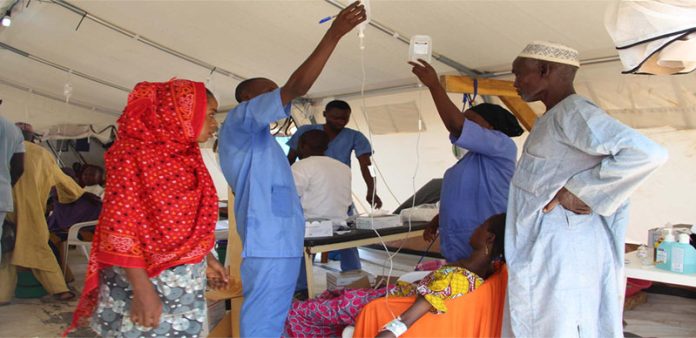Cholera has become a recurring epidemic globally and Nigeria is not isolated as it has reportedly earned a reputation among the highest recorded cases in the continent.
In a recent report in its formal website, the United Nations World Health Organisation, WHO, announced recently that there is a spike in cholera in several regions of the world, with about 195,000 cases and over 1900 deaths reported in 24 countries since January.
On a disturbing note, the UN health agency said it exhausted its global stockpile of Oral Cholera Vaccines ,OCV, by March but was able to exceed “The emergency target of five million doses in early June for the first time in 2024″.
Yet, the supply of the vaccine does not equate to its demand.
WHO reported that since January last year, 16 countries requested 92 million doses of OCV; almost double the 49 million produced during that time.
WHO, the UN Children’s Fund ,UNICEF, and other partners are working together to use resources to find long-term solutions for cholera.
Back in Nigeria, the Centre for Disease Control and Prevention said the country has recorded 1,528 suspected cases of cholera and 53 deaths in 31 states across 107 Local Government Areas.
The Director General of the NCDC, Dr Jide Idris, said this recently at a press briefing on the update on the cholera situation in the country.
Idris also said the Federal Government has activated the National Emergency Operation Centre for cholera.
He said, “As of June 24, 2024, 1,528 suspected cases and 53 deaths have been recorded across 31 states and 107 LGAs with a case fatality rate of 3.5% since the beginning of the year.
“These fatalities are not just statistics but a significant loss of a loved family member, a spouse, a parent, and often a seasoned healthcare worker and team member.
“This situation is compounded as the rainy season intensifies”.
He disclosed that experts who conducted the risk assessment just recently, placed Nigeria at high risk of increased cholera transmission and impact.
According to WHO, Cholera is an acute diarrhoeal infection caused by ingestion of food or water contaminated with the bacterium Vibrio cholerae. Cholera remains a global threat to public health and an indicator of inequity and lack of social development.
Cholera is an extremely virulent disease transmitted through the ingestion of contaminated food or water. It can cause severe acute watery diarrhoea and the severe forms of the disease can kill within hours if left untreated.
Most people infected with V. cholerae do not develop any symptoms, although the bacteria could be present in their faeces for 1–10 days after infection and are shed back into the environment, potentially infecting other people.
Among people who develop symptoms, the majority have mild or moderate symptoms. It takes between 12 hours and 5 days for a person to show symptoms. A minority of patients develop acute watery diarrhoea with severe dehydration. This can lead to death if left untreated.
Worse still, unverified claims by some health professionals hold that poorly treated cholera may cause kidney damage. How that is correct would depend on when the postulation moves from the realm of fact after validly verified.
As it is, Cholera has invaded the country and we must not treat it with levity. Stating that cholera’s pangs are phenomenally deadly, would be an understatement. It is therefore of the essence for the government not to rest on its oars in ensuring it curbs the menace proactively.
We urge that the twain issues of water and sanitation should take the front burner now to mitigate the situation now and in the future.
Part of the measures paramount at this time is to get vaccines by every means notwithstanding the cries by government that it is waiting on donors to accede to its request. The government should not be seen as helpless on this matter of grave national priority.
Indeed, relevant stakeholders should tune up their advocacy mechanisms to reach vulnerable rural communities and ghettos across the country, highlighting the risk elements and how to avoid, mitigate the spread of cholera.





